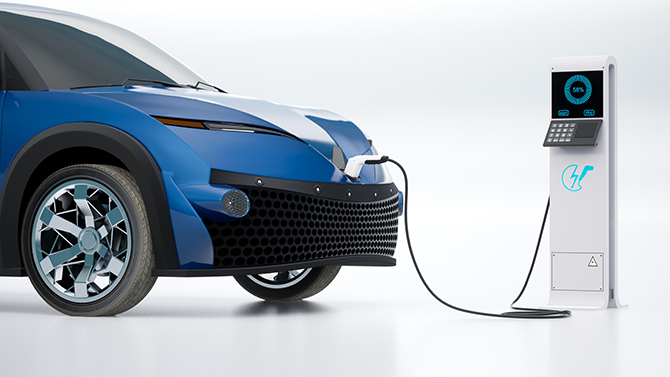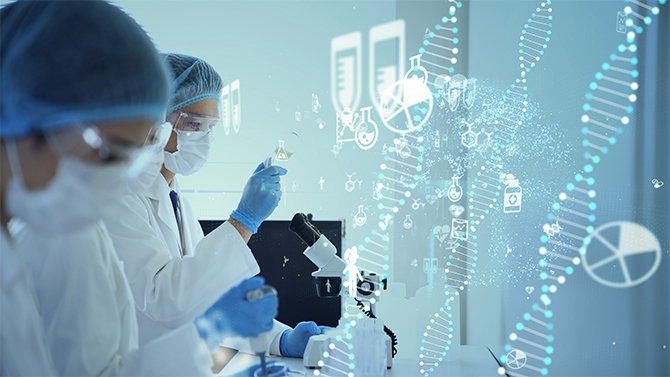Social Issues addressed by Sumitomo —Compass for the Future—
New-generation rehabilitation for hand/finger paralysis applying AI and robotics to promote movement
 Advanced Medicine
Advanced Medicine Wellness
WellnessSumitomo Pharma changed its trade name from Sumitomo Dainippon Pharma in April 2022. As a pharmaceutical company, it has long been a leading source of pharmaceutical products for treatment of diseases. Alongside its mainstay business centering on neuropsychiatric drugs, Sumitomo Pharma is nowadays also vigorously engaged in R&D in oncology and regenerative medicine/cell therapy, laying the foundation for a new business at the frontier of medical science, encompassing prevention of presymptomatic diseases and post-treatment care. Through this Frontier Business, Sumitomo Pharma aims to offer comprehensive support throughout the “patient journey,” from disease prevention to diagnosis, treatment, care, and reintegration into society. The idea is to protect people’s wellbeing by combining non-medical solutions with medication.
For prevention of diseases and social reintegration, which fall chronologically before and after the treatment phase of diseases, respectively, non-pharmaceutical technologies and expertise are required in many cases, in addition to the pharmaceutical technologies and know-how that Sumitomo Pharma has long cultivated. In April 2019, Sumitomo Pharma established the Frontier Business Office, an organization whose mission is to efficiently promote the creation and provision of non-pharmaceutical solutions.
The Frontier Business Office is developing solutions primarily focused on diagnosis, treatment, and post-treatment care for dementia, depression, and motor dysfunction. In September 2022, Sumitomo Pharma started marketing a hand/finger rehabilitation system, the first frontier business product. This is the MELTz® Hand Rehabilitation System (MELTz) marketed in alliance with MELTIN MMI (MELTIN), a startup that develops medical devices and avatars utilizing proprietary bio-signal processing and robotics. MELTz will be marketed mainly for use on rehabilitation wards for convalescing patients.

The commercialization of MELTz addresses a pressing need. Many patients are left with paralysis as an after-effect of stroke. According to the Ministry of Health, Labour and Welfare, the number of stroke patients in Japan exceeds 1.2 million*1. Stroke is the second leading cause of people needing long-term nursing care and the leading cause of people becoming bedridden (requiring long-term nursing care level 4 or 5)*2. Most patients can be expected to recover from paralysis due to stroke and other causes, to a greater or lesser extent, through rehabilitation. However, priority is accorded to rehabilitation of lower limbs for walking and swallowing for eating, whereas rehabilitation of the hands and fingers is given a lower priority. In fact, in the case of paralysis, there is an evident need to move the hands for eating, dressing, toileting, etc., but in many cases hand rehabilitation is put on the back burner during the limited time available for rehabilitation.
*1 “Summary of Patient Survey 2020”
*2 “Summary of Comprehensive Survey of Living Conditions 2019”
Meanwhile, robotic rehabilitation has been attracting attention because of its potential to achieve prominent effects. Yet so complex are the movements of our hands and fingers that it has been exceedingly difficult to apply robotics in the rehabilitation of patients suffering hand/finger paralysis. Hence the significance of Sumitomo Pharma’s development and commercialization of a robotic rehabilitation device specialized for the hand/finger motor function, using MELTIN’s technology.
The MELTz hand rehabilitation system developed jointly with MELTIN focuses attention on myoelectricity, that is, the bio-signals transmitted to motor nerves. When a patient intends to move the patient’s hand, subtle myoelectric signals are generated in the forearm in response to instructions from the brain. Proprietary technology using AI analyzes the myoelectricity and presumes the patient’s intended movements of the patient’s hand/fingers. A robotic device attached to the hand/fingers assists the patient with the movements, synchronizing with the patient’s intention so that the brain and nerves relearn how to move the hand/fingers. Since the robotic device is attached to the back of the patient’s hand, the palm is free, which is advantageous for training in the grasping of objects. The robotic device can also be used for passive training in which it moves the hand/fingers even when the paralysis is such that there is no myoelectricity.

There is a growing body of evidence indicating that use of MELTz in rehabilitation to move the hand/fingers according to the patient’s intention is effective for relearning. Sumitomo Pharma aims to accumulate more evidence and promote the use of MELTz as a medical device in the field of rehabilitation. The progress of medical technology is a key element in Sumitomo Pharma’s vision emphasizing people’s wellbeing. While the top priority is to prevent any further increase in the number of patients unable to move their hands because of paralysis attributable to stroke or other causes, Sumitomo Pharma is also committed to helping the patients suffering from paralysis regain healthy lifestyles through prompt and appropriate rehabilitation by utilizing MELTz and other robotic devices.


Read about initiatives to achieve a low-carbon society, aiming at net-zero greenhouse gas emissions since these emissions are implicated in global warming.

In view of ongoing globalization and the growing complexity of supply chains, companies need to respond appropriately to issues in supply chains.

The pace of workstyle reform is accelerating as the COVID-19 pandemic has prompted numerous companies to embrace novel ways of working.

For companies, the COVID-19 pandemic has brought the crucial importance of employee health into sharp focus.

Accelerating global warming poses serious business risks. Accordingly, companies need to formulate strategies and implement specific countermeasures from a medium- to long-term perspective.

Spurred by efforts to reduce environmental impacts and in line with increasing social needs, replacement of gasoline-powered vehicles with electric vehicles is accelerating.

Vigorous initiatives are afoot to tackle social issues by revitalizing communities and the interpersonal relationships that bind them together.

Poverty persists in contemporary Japan and the existence of child poverty is a grave concern.

In view of the continuing decline of Japan’s working age population, due to population aging coupled with a low birthrate, development of the next generation is an urgent issue.

The rapid progress in medicine in recent years is largely due to the efforts of not only universities and other research institutions but also of companies to develop cutting-edge technologies.

Numerous initiatives to promote industry and commerce at the regional and community level are underway, involving the use of renewable energy and thus contributing to decarbonization.

One-third of food produced is lost or wasted globally, amounting to about 1.3 billion tons per year. Food loss and waste is a pressing issue in need of a solution.

Companies are addressing a wide range of issues so that people and companies can coexist in harmony with the global environment.

In addition to natural disasters, there are various types of hazards whose nature, incidence and severity are changing with the times. Resilience and flexibility are indispensable in dealing with them.

Read about initiatives to achieve sustainable regional revitalization. The attributes and resources that each region can offer are leveraged to strengthen local economies and overcome the problem of population decline.